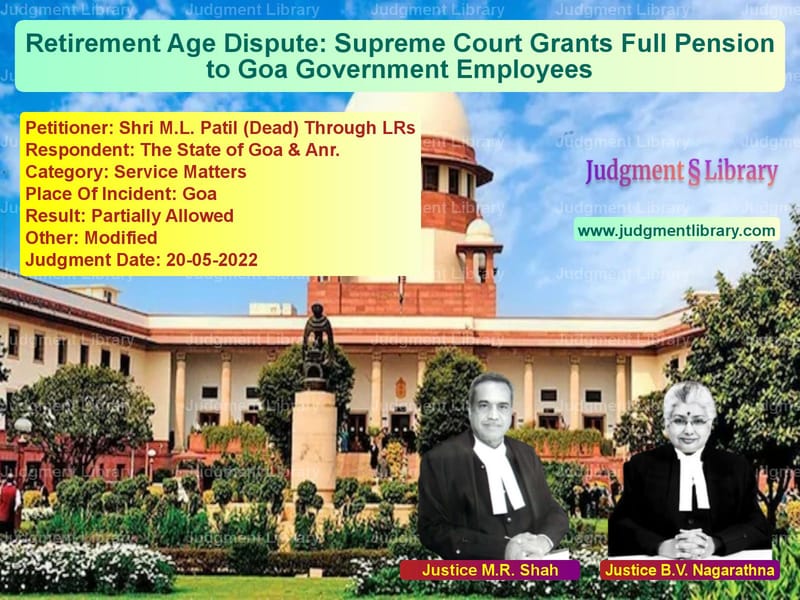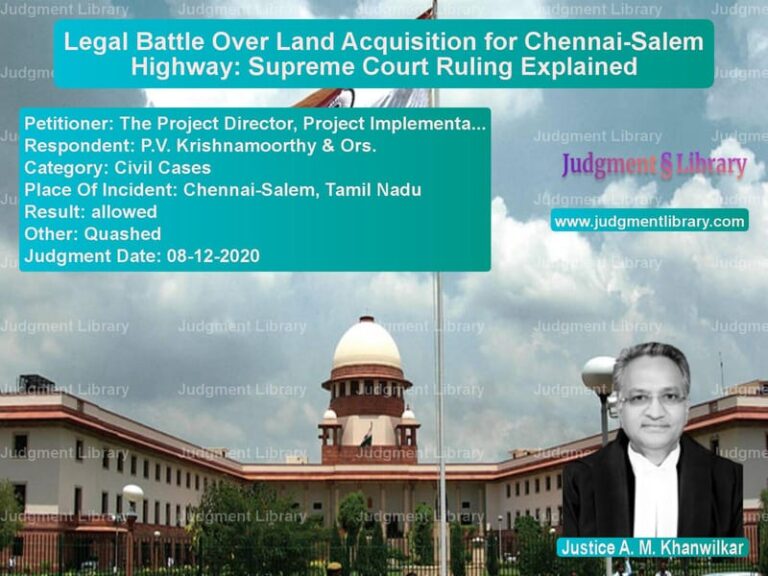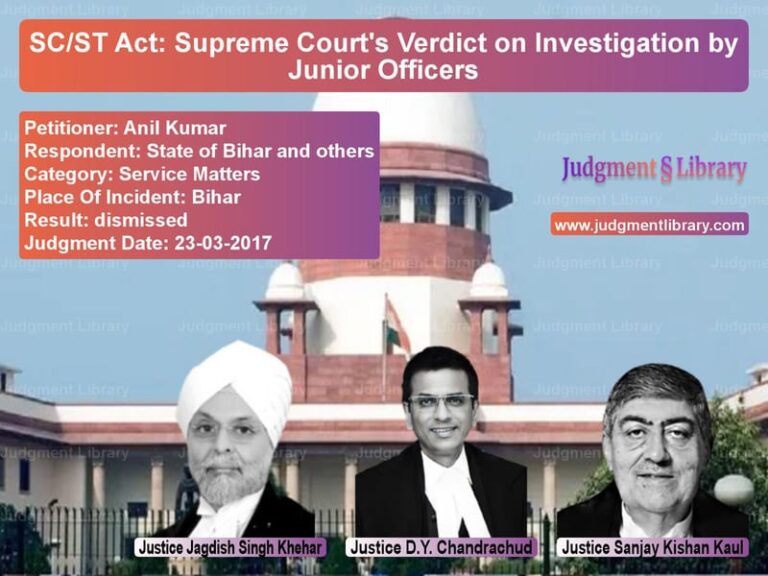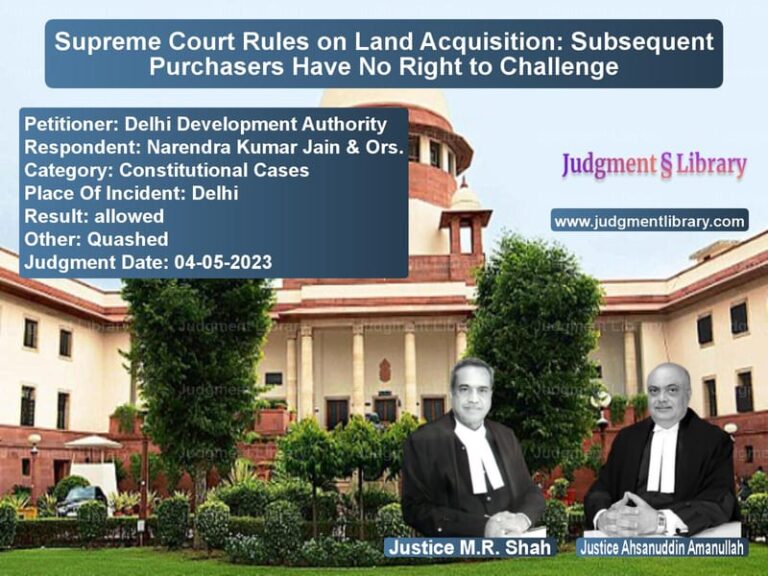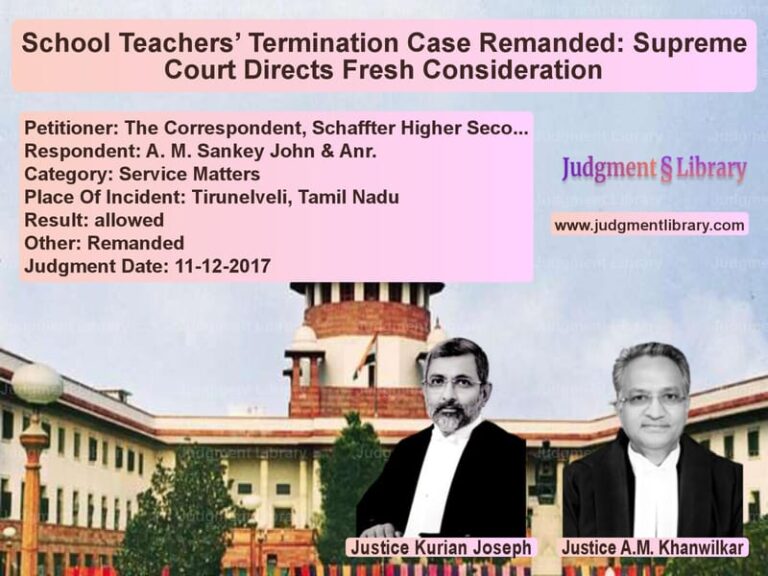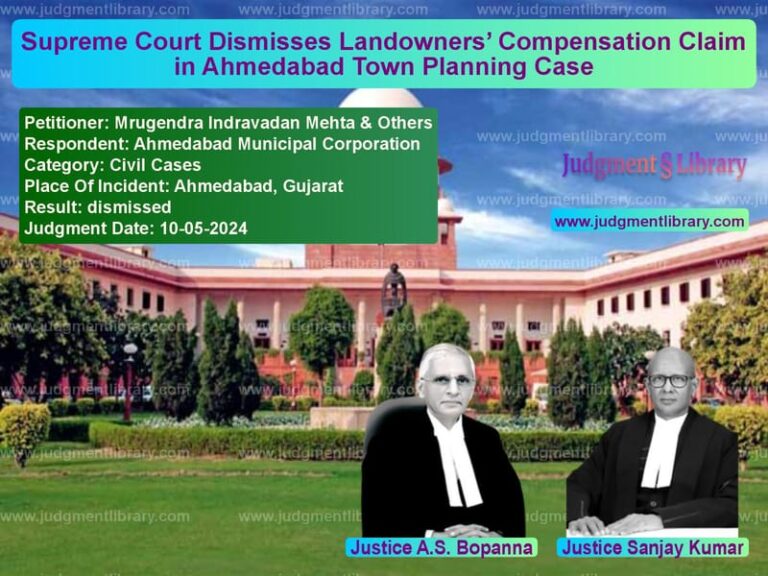Retirement Age Dispute: Supreme Court Grants Full Pension to Goa Government Employees
The Supreme Court of India recently ruled in the case of Shri M.L. Patil (Dead) Through LRs vs. The State of Goa & Anr., addressing the dispute regarding the superannuation age of government employees in Goa. The judgment has significant implications for pension entitlements and retirement policies in the state.
The Court held that the High Court was correct in declaring that the retirement age of the petitioners was 60 years instead of 58 years. However, it overturned the High Court’s decision to deny arrears of pension and ruled that pension must be paid at the revised rates from the date the petitioners attained 60 years.
Background of the Case
The appellant, Shri M.L. Patil, along with others, was forced to retire at the age of 58 years by the Goa Government. The petitioners argued that their retirement age was legally 60 years and that the government’s action was unlawful. They approached the High Court, challenging their premature superannuation.
The High Court ruled in their favor, holding that the petitioners should have been retired at the age of 60. However, it denied them back wages for the additional two years of service and ruled that pension at the revised rates would be payable only from January 1, 2020.
Aggrieved by the denial of pension arrears, the petitioners approached the Supreme Court, arguing that they were entitled to pension from the date they attained 60 years and that the High Court erred in limiting their entitlement.
Key Legal Issues Before the Supreme Court
- Whether the retirement age of government employees in Goa should be 60 years instead of 58 years.
- Whether the petitioners were entitled to back wages for the additional two years of service.
- Whether the petitioners were entitled to arrears of pension from the date they should have retired at 60 years.
- Whether the High Court erred in restricting the payment of pension at revised rates only from January 1, 2020.
Arguments Presented
Petitioner’s (Shri M.L. Patil & Others) Arguments
- The government’s action in retiring them at 58 years was illegal and arbitrary.
- The High Court correctly held that the retirement age was 60 years, but it was wrong in denying them pension arrears.
- Pension is a continuous cause of action, and denying arrears would amount to unfair treatment.
- They should have been allowed to continue in service for two additional years, but since that was denied, they must be compensated through full pension benefits.
Respondent’s (State of Goa) Arguments
- The government had applied the existing policy at the time and had no intent to discriminate.
- The High Court’s ruling to deny back wages was justified since the petitioners had not actually worked during the two years in question.
- The petitioners should not be given undue financial benefits beyond what the High Court had already granted.
Supreme Court’s Observations and Ruling
1. Retirement Age Should Be 60 Years
The Supreme Court upheld the High Court’s ruling that the government’s decision to retire the employees at 58 years was illegal. The Court stated:
“The action of the State Government in requiring the original petitioners to retire at the age of 58 years or not permitting them to continue in their service up to the age of 60 years is illegal and null and void.”
Read also: https://judgmentlibrary.com/supreme-court-overrules-rangaiah-new-rules-govern-service-vacancies/
2. No Back Wages for the Two Additional Years
The Court agreed with the High Court that the petitioners could not be granted back wages for the additional two years they were denied work. It held:
“The High Court may be right in denying any salary for the period of two extra years to the writ petitioners if they would have continued in service, on the ground of delay.”
3. Pension Arrears Must Be Paid from 60 Years
The Supreme Court ruled that the High Court erred in denying pension arrears. It stated:
“As far as the pension is concerned, it is a continuous cause of action. There is no justification at all for denying the arrears of pension as if they would have been retired at the age of 60 years.”
4. Pension Must Be Paid at Revised Rates
The Court overturned the High Court’s direction that pension at revised rates would be payable only from January 1, 2020. It held:
“There is no justification at all by the High Court to deny the pension at the revised rates and payable only from 1st January, 2020.”
5. Timeline for Arrears Payment
The Court directed the Goa Government to clear all arrears within four weeks from the date of judgment:
“Now the arrears accordingly shall be paid to the appellant within a period of four weeks from today.”
Impact of the Judgment
This ruling has far-reaching implications for government employees in Goa and across India.
1. Establishing 60 Years as Retirement Age
The decision confirms that the retirement age in Goa should be 60 years, ensuring that employees are not forced to retire early without legal justification.
2. Strengthening Pension Rights
The Court reinforced the principle that pension is a continuous right and should not be arbitrarily curtailed.
3. Clarification on Arrears and Back Wages
While denying back wages, the ruling ensures that pension arrears must be paid from the date an employee should have retired.
4. Protection Against Arbitrary Government Actions
The ruling prevents state governments from changing retirement policies unfairly without clear legal backing.
5. Setting Precedent for Future Cases
This judgment will serve as a precedent for other retirement and pension-related cases across India.
Conclusion
The Supreme Court’s ruling in Shri M.L. Patil (Dead) Through LRs vs. The State of Goa & Anr. is a landmark decision that protects the rights of government employees. By ensuring that employees are retired at the correct age and that pension arrears are fully paid, the judgment upholds fairness and legal accountability. This ruling will have a lasting impact on retirement policies, ensuring that employees receive the benefits they are entitled to without undue delay or denial.
Petitioner Name: Shri M.L. Patil (Dead) Through LRs.Respondent Name: The State of Goa & Anr..Judgment By: Justice M.R. Shah, Justice B.V. Nagarathna.Place Of Incident: Goa.Judgment Date: 20-05-2022.
Don’t miss out on the full details! Download the complete judgment in PDF format below and gain valuable insights instantly!
Download Judgment: shri-m.l.-patil-(dea-vs-the-state-of-goa-&-a-supreme-court-of-india-judgment-dated-20-05-2022.pdf
Directly Download Judgment: Directly download this Judgment
See all petitions in Pension and Gratuity
See all petitions in Employment Disputes
See all petitions in Judgment by Mukeshkumar Rasikbhai Shah
See all petitions in Judgment by B.V. Nagarathna
See all petitions in partially allowed
See all petitions in Modified
See all petitions in supreme court of India judgments May 2022
See all petitions in 2022 judgments
See all posts in Service Matters Category
See all allowed petitions in Service Matters Category
See all Dismissed petitions in Service Matters Category
See all partially allowed petitions in Service Matters Category

